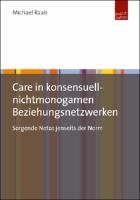Care in konsensuell-nichtmonogamen Beziehungsnetzwerken
Sorgende Netze jenseits der Norm
| dc.contributor.author | Raab, Michael | |
| dc.date.accessioned | 2023-01-18T10:50:14Z | |
| dc.date.available | 2023-01-18T10:50:14Z | |
| dc.date.issued | 2019 | |
| dc.identifier.uri | https://library.oapen.org/handle/20.500.12657/60683 | |
| dc.description.abstract | Polyamory and other non-monogamous relationships are becoming increasingly visible. They are often seen as a more self-determined and gender-equitable alternative to conventional marriage and family. The Marxist, feminist and intersectionally well-founded qualitative study shows what characterizes these relationship networks. Is it possible in the area of care to implement the self-imposed emancipatory claims? | en_US |
| dc.language | German | en_US |
| dc.subject.classification | thema EDItEUR::J Society and Social Sciences::JB Society and culture: general::JBS Social groups, communities and identities::JBSF Gender studies, gender groups::JBSF1 Gender studies: women and girls::JBSF11 Feminism and feminist theory | en_US |
| dc.subject.other | Polyamorie;Konsensuelle Nichtmonogamie;Care;Genderforschung;Minderheiten;Intersektionalität;Rollenbilder;Normativität;Hegemoniale Normen | en_US |
| dc.title | Care in konsensuell-nichtmonogamen Beziehungsnetzwerken | en_US |
| dc.title.alternative | Sorgende Netze jenseits der Norm | en_US |
| dc.type | book | |
| oapen.abstract.otherlanguage | Polyamorie und andere nichtmonogame Beziehungen werden zunehmend sichtbar. Oft werden sie als selbstbestimmtere und geschlechtergerechtere Alternative zu konventioneller Ehe und Familie gesehen. Die marxistisch, feministisch und intersektional fundierte qualitative Studie zeigt, was diese Beziehungsnetzwerke auszeichnet. Gelingt es im Bereich der Sorge (Care), die selbst gesteckten emanzipatorischen Ansprüche umzusetzen? | en_US |
| oapen.identifier.doi | 10.3224/86388817 | en_US |
| oapen.relation.isPublishedBy | c71f4dcb-6466-4fde-8a25-0516cdd477b8 | en_US |
| oapen.relation.isbn | 9783863888176 | en_US |
| oapen.imprint | Budrich UniPress | en_US |
| oapen.pages | 254 | en_US |

